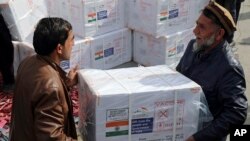Afghanistan’s Taliban said Friday they had received a fresh supply of medicines from India, as the United Nations warns harsh winter conditions are aggravating the severe humanitarian crisis facing millions of Afghans.
“The Islamic Emirate is grateful to India for its humanitarian assistance and cooperation,” said Taliban spokesman Zabiullah Mujahid in a local language tweet after Kabul airport authorities received the aid package. Mujahid used the official name of the new Taliban government.
The Indian foreign ministry noted in a statement that Friday’s delivery was the third batch of medical assistance “consisting of two tonnes of essential life-saving medicines” and said it is part of New Delhi’s ongoing humanitarian aid to Afghanistan.
India already has delivered half a million doses of COVID-19 vaccines and 1.6 tons of medical aid to Kabul through the World Health Organization. It has pledged to supply more medicines and food grains in coming weeks.
“India stands committed to continue our special relationship with the people of Afghanistan and provide them humanitarian assistance,” the ministry said.
New Delhi also has pledged to send 50,000 tons of wheat to Afghanistan and requested neighboring Pakistan’s help by allowing its transportation through its territory. Islamabad agreed to New Delhi’s request in November, and the two arch-rival countries are reported to be sorting out the modalities of the transportation.
Already in bad shape
Relief agencies say the humanitarian situation in Afghanistan was bad even before the Islamist Taliban took over the country last August, citing years of conflict and a prolonged nationwide drought.
The subsequent suspension of international assistance, though, along with international sanctions on the Taliban, and the freezing of Afghanistan's foreign cash reserves by many countries and donor agencies have triggered an economic crisis in the aid-dependent country — increasing humanitarian needs to record levels.
The U.N. estimates that more than 24 million Afghans will need humanitarian assistance this year, and more than nine in 10 of them are likely to be acutely food insecure by March.
India maintained close ties with the Western-backed Afghan government ousted by the Taliban ousted in August. New Delhi invested several billion dollars in development projects in Afghanistan over the past several years to increase its influence in the country.
But the Indian diplomatic effort suffered a huge blow with the final withdrawal of the United States and allied troops from Afghanistan days after the Taliban retook power. The Islamist group is believed to have used sanctuaries in Pakistan to sustain its two decades long violent insurgency against local and foreign troops in Afghanistan.
Attempt at renewal
India’s latest effort to provide humanitarian aid to Kabul is seen as an attempt to renew its diplomatic engagement with the country to sustain developmental projects, though Indian leaders remain deeply skeptical about the Taliban’s close ties with Pakistan.
In a video statement posted online Friday, Deputy Prime Minister Mullah Abdul Ghani Baradar of the acting Taliban government urged the rapid delivery of humanitarian aid to tackle the crisis. He said people in various places do not have food, accommodations, warm clothes or money.
“We call for the international community, NGOs and all the countries not to forget our poor people,” said Baradar in what was the first direct appeal made by a senior Taliban leader to the international community.
No country has formally recognized the Taliban government, making the delivery and distribution of humanitarian aid a tremendous logistical challenge. Foreign governments providing the aid must also make sure money does not reach the ruling Islamist group, which remains under international sanctions.
Last month, the U.N. Security Council unanimously adopted a U.S.-proposed resolution to help humanitarian operations access desperate Afghans without violating the sanctions.
The Paris-headquartered Doctors Without Borders relief group, known by its French acronym MSF, said Friday that the suspension of funding from many international donors and the impact of sanctions and other punitive financial measures have had devastating consequences on people’s health in a country where the health care system has been struggling for years.
“There are massive health and humanitarian needs in Afghanistan that need attention," said the MSF statement. "The country now faces a near economic and institutional collapse as the banking sector remains paralyzed and the currency has been severely devalued.”
Prices for necessities such as food are skyrocketing, the statement added, further fueling the humanitarian crisis.




